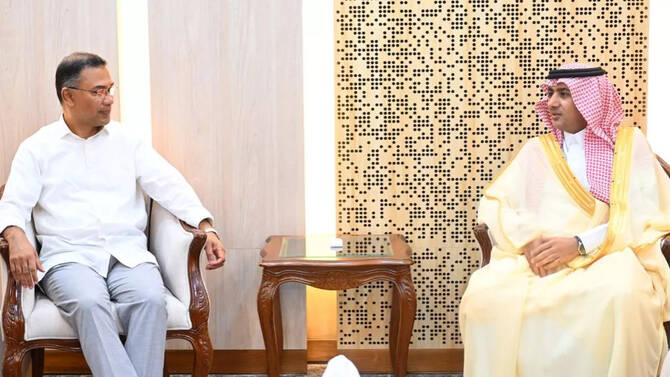DETROIT: Putting Vice President Kamala Harris at the top of the Democratic ticket increases the Democrats’ chance of winning Michigan and keeping the White House in November, the head of the United Auto Workers union says.
In an interview Friday with The Associated Press, Shawn Fain said former President Donald Trump is beholden to billionaires, knows nothing about the auto industry and would send the labor movement into reverse if he’s elected again.
“Trump has never supported working class people. He has never supported unions,” Fain said. “But he sure as hell was trying to pander for our votes now.”
Fain has become a top nemesis of the Republican presidential nominee, who frequently rails against him at rallies and in speeches. Trump has called him an idiot, courting autoworkers’ votes by saying Fain is putting their jobs at risk by embracing a move to electric vehicles.
Although the UAW has members across the nation, many auto-making jobs are concentrated in the Great Lakers region and Michigan, a key swing state that could decide the presidential race in November. This week, the UAW endorsed Harris.
Trump and Harris realize that increasing their share of union votes gives them a much better chance of taking Michigan, where the last two presidential elections have been close, said Marick Masters, a business professor emeritus at Wayne State University who follows labor issues.
Trump won the state by just 11,000 votes in 2016 over Democrat Hillary Clinton, and then lost the state four years later by nearly 154,000 votes to President Joe Biden.
Appealing to autoworkers helps to get votes from other union members, and union membership is high in the state at about 556,000, Masters said. That doesn’t include thousands of family members and union retirees, he said. Any swing in those votes would be consequential in the race.
During his acceptance speech at the Republican convention last month, Trump called on union workers to fire Fain, using false statements that Chinese auto companies are building factories in Mexico to ship vehicles to the US without tariffs. Industry analysts say they aren’t aware of any such plants under construction, at least not yet.
“You probably have to get rid of this fool, this stupid idiot representing the United Auto Workers,” Trump said at a July 20 rally in Grand Rapids, Michigan. Trump claimed that he’ll get 95 percent of the UAW vote because Fain is pushing electric vehicles. “They’re going to be made in China,” he said.
He also pledged to bring the auto industry back from obliteration if he’s elected.
But the industry is far from obliteration. Since Biden took office in January 2021, employment making cars and parts has grown 13.8 percent to just over 1 million people, according to the Labor Department. Detroit automakers General Motors, Ford and Stellantis have made billions in annual profits.
Fain dismissed the insults as typical Trump behavior. “All the man does his name call, label people. He never has solutions,” Fain said. “That’s the problem in leadership. You need to find solutions.”
The move from internal combustion vehicles to those powered by electricity is inevitable, Fain said, and union members need to be ready for it. During the transition, auto companies are still making gasoline vehicles and keeping factory workers employed, he said.
Trump, he said, did nothing for autoworkers when General Motors closed its small-car assembly plant in Lordstown, Ohio, in 2019. Biden, who last month announced he would drop out of the race and support Harris, helped to get GM to build an electric vehicle battery plant in the Lordstown area, replacing some of the lost jobs, Fain said.
On Friday, the chairman of the Democratic National Committee said Harris has secured enough votes from delegates to become her party’s nominee.
Fain said he’s confident that Harris will remain an advocate for working people, citing her trip to walk picket lines with striking GM workers in 2019. “She was there with the president through a lot of things we’ve been through,” he said. “She’s been there for labor.”
Of candidates to become Harris’ vice presidential choice, the union prefers Kentucky Gov. Andy Beshear, followed by Minnesota Gov. Tim Walz and Illinois Gov. J.B. Pritzker, Fain said.
The union isn’t backing Arizona Senator Mark Kelly because he has opposed a bill that would boost union organizing, and Pennsylvania Gov. Josh Shapiro favors school vouchers, which would take send tax dollars to private schools and hurt public schools, Fain said.
But even if Harris doesn’t pick one of the union’s favorites, the 370,000-member UAW would still put its political might behind her, Fain said.
“I think she’s a brilliant woman. A very strong person,” Fain said. “She understands the issues. I think Trump’s just all talk. That’s all he’s ever been. He’s a showman.”
In a statement, Trump’s campaign called Fain “a puppet for the Democrat party” who isn’t serving union laborers who are supporting Trump.
“Shawn Fain’s empty words don’t matter — President Trump will take action to fight for the American auto worker,” the statement said.
















